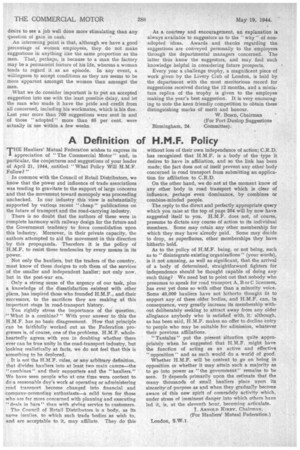A Definition of H.M.F. Policy T HE:Hauliers' Mutual Federation wishes to
Page 34

If you've noticed an error in this article please click here to report it so we can fix it.
express its appreciation of " The Commercial Motor" and, in particular, the conjectures and suggestions of your leader of April 21, 1944, entitled "What Policy Will H.M.F. Follow? "
In common with the Council of Retail Distributors, we know that the power and influence of trade associations was tending to gravitate to the support of large concerns and that the movement toward monopoly was proceeding unchecked. In our industry this view is substantially_ supported by various recent " cheap " publications on the future of transport and the road-carrying industry.
There is no doubt that the authors of these were in Complete harmony with railway design for the future and the Government tendency to force consolidation upon this industry. Moreover, in their private capacity, the authors attempted to aid the movement in this direction by this propaganda, Therefore it is the policy of H.M.F. to resist these tendencies by every means in its power.
Not only the hauliers, but the traders of the country, must know of these designs to rob them of the services of the smaller and independent haulier; not only now, but in the post-war era.
Only a strong sense of the urgency of our task, plus a knowledge of the dissatisfaction existent with other plans, has inspired those who founded H.M.F., and their successors, to the sacrifices they are making at this important stage in road-transport history. 7
You rightly stress the importance of the question, .'" What is a combine?" With your answer to this the H.M.F. has no basic disagreement. How that principle • can be faithfully worked out as the Federation progresses is, of course, one of the problems. H.M.F. wholeheartedly agrees with you in doubting whether there ever can be true unity in the road-transport industry, but looking realistically at facts, we do not feel that this is something to be deplored.
, It is nofthe H.M.F. rules, or any arbitrary definition, that divides hauliers into at least two main camps—the " combines " and their supporters and the " hauliers." We have seen people Who at one time were content to do a reasonable day's work at operating or administering road transport become changed into financial and company-promoting enthusiasts—a mild term for those who are far more concerned with planning and executing " deals in bars" than with givingservice to customers.
The Council of Retail Distributors is a body, as its name implies. to which such trade bodies as wish to, and are acceptable to it, may affiliate. They do this
without loss of their own independence of action; C.R.D. has recognized that H.M.F. is a body of the type it desires to have in affiliation, and so the link has been made; the fact does not of itself prevent any other body concerned in road transport front submitting an application for affiliation to c.R.D.
On the other hand, we do not at the moment know of any other body in road transport which is clear of influence, perhaps even dominance, by combines or cornbine-minded people.
The reply to the direct and perfectly appropriate query which you raise at the top of page 204 will by now have suggested itself to you. H.M.F. does not, of course, presume to dictate any course of action to its individual members. Some may retain any other membership for . which they may have already paid. Some may decide to drop, as superfluous, other memberships they have hitherto held.
As to the policy of H.M.F. being, or not being, such as to "disintegrate existing organizations" (your words), is it not amusing, as well as significant, that the arrival of a body Of determined, straightforward fighters for independence should be thought capable of doing any such thing? We need but to point out that nobody who presumes to speak for road transport A, B or C licensees, has ever yet done so with other than a minority voice. Some 40,000 hauliers have not hitherto thought fit to support any of these older bodies, and H.M.F. can, in consequence, very greatly increase its membership without deliberately seeking to attract away from any older allegiance anybody who is satisfied with, it; although, as has been said, H.M.F. makes no offer to decline entry to people who may be suitable for admission, whatever their previous affiliations.
"Tantalus" put the present situation quite appropriately when he suggested that H.M.F. might have the function of acting as an active and effective " opposition " and as such would do a world of good. Whether H.M.F. will be content to go on being in opposition or whether it may attain such a majority as to go into power as "the government" remains to be seen. It depends primarily upon the estimate that the many thousands of small hauliers place upon its sincerity of purpose as and when they gradually become aware of this new spirit of comradely activity which, under stress of imminent danger into which others have led it, is, at the eleventh hour, becoming articulate.
Actiaonn KTRBY, Chairman, (For Hauliers' Mutual Federation.) London, S.W.I.




























































